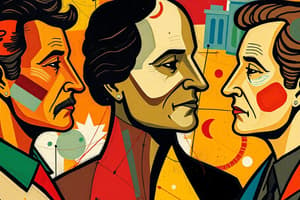Podcast
Questions and Answers
What is the core idea behind individualism?
What is the core idea behind individualism?
- Equality of outcome
- Government control over economy
- Independence and self-reliance (correct)
- Collective ownership of resources
According to pluralists, news media organizations have limited influence in shaping public opinion.
According to pluralists, news media organizations have limited influence in shaping public opinion.
False (B)
What is the primary way that wealth translates to political influence according to conflict theorists?
What is the primary way that wealth translates to political influence according to conflict theorists?
Funding for special interest groups, lobbyists, political campaigns, and policy institutes or think tanks
The legal result of Citizens United v. Federal Election Commission (2010) was that corporations and labor unions have the right to make _______________ expenditures that advocate election or defeat of candidates.
The legal result of Citizens United v. Federal Election Commission (2010) was that corporations and labor unions have the right to make _______________ expenditures that advocate election or defeat of candidates.
Match the following ideologies with their core concepts:
Match the following ideologies with their core concepts:
According to Max Weber, what is 'rational-legal authority'?
According to Max Weber, what is 'rational-legal authority'?
In a democracy, power is concentrated in the hands of a single individual or group.
In a democracy, power is concentrated in the hands of a single individual or group.
What are the three types of rights associated with citizenship that help sustain a balance of power between social groups?
What are the three types of rights associated with citizenship that help sustain a balance of power between social groups?
According to Seymour Martin Lipset, there are five fundamental tenets of American political culture that serve to limit and check the concentration of ___________.
According to Seymour Martin Lipset, there are five fundamental tenets of American political culture that serve to limit and check the concentration of ___________.
Match the following types of rights with their corresponding descriptions:
Match the following types of rights with their corresponding descriptions:
Flashcards are hidden until you start studying
Study Notes
Power and Authority
- According to Max Weber, power is the ability of an individual or group to achieve its goals despite the resistance of others.
- Rational-legal authority is domination legitimated on the basis of legally enacted rules and the right of those with authority under those rules to issue commands.
Pluralism and Democracy
- According to pluralists, political power is distributed and exercised in liberal democracies through a balance of group power, where no one group retains power indefinitely.
- Government policies are influenced by the continual process of bargaining among numerous groups representing different interests, dividing up power.
- All groups have an effect on policy, but none dominate the mechanisms of government.
Citizenship and Rights
- Civil rights include freedom of speech and religion, the right to own property, and equal justice.
- Political rights refer to the right to participate in elections and run for public office.
- Social rights refer to the right of every individual to enjoy a minimum standard of economic welfare and security.
- A balance of power between social groups is sustained by civil, political, and social rights associated with citizenship.
Interest Groups and Lobbying
- Interest groups are organizations that attempt to persuade elected officials to consider their aims when deciding on legislation.
- The right to freedom of expression and assembly enables the formation of interest groups.
- Lobbying is the act of persuading influential officials to vote in favor of a cause or otherwise lend support to the aims of the interest group.
American Political Culture
- According to Seymour Martin Lipset, the five fundamental tenets of American political culture that serve to limit and check the concentration of political power are: liberalism, individualism, populism, meritocracy, and anti-statism.
Nation-State and Nationalism
- A nation-state is a political apparatus or government that rules over a territory, associated with the rise of nationalism, which is a set of symbols and beliefs that creates a sense of membership in a single political community.
News Media and Public Sentiment
- News media organizations operate within a free market, competing amongst each other for audiences.
- News media has considerable influence shaping the public's views of social and political issues.
- News media can relay a certain body of information and attitudes toward that information to people who are open to receiving it.
Wealth, Power, and Lobbying
- Wealth translates to political power through funding for special interest groups, lobbyists, political campaigns, and policy institutes or think tanks.
- Lobbying allows corporations and labor unions to spend unlimited amounts on independent expenditures advocating for the election or defeat of candidates.
Campaign Finance and Spending
- The Citizens United v. Federal Election Commission (2010) court ruling overturned restrictions on unlimited corporate and union spending, allowing corporations and labor unions to make independent expenditures advocating for election or defeat of candidates.
- Candidates, national parties, and super PACs spend the bulk of their campaign funds on various campaign activities.
Studying That Suits You
Use AI to generate personalized quizzes and flashcards to suit your learning preferences.




